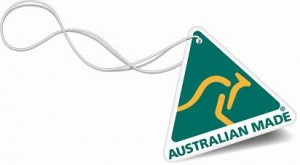 mpetition and Consumer Commission (ACCC) has published new guidance to assist businesses to comply with the Australian Consumer Law (ACL) when making country of origin claims.
mpetition and Consumer Commission (ACCC) has published new guidance to assist businesses to comply with the Australian Consumer Law (ACL) when making country of origin claims.The ACCC’s guidance provides information and examples to illustrate when businesses can say their goods are “Made in”, “Product of” or “Grown in” Australia, and includes advice on how a business can rely on the ‘safe harbour’ provisions in the ACL. The ACCC said the guidance also aims to clarify specific country of origin issues raised by various industries.
“Country of origin labels are valuable tools that allow consumers to make informed choices and let businesses compete fairly,” said Rod Sims, ACCC Chairman.
“Many consumers specifically seek out, or are willing to pay a premium for, Australian produce, or products that are made in Australia,” Mr Sims said. “This information assists manufacturers, wholesalers, importers, retailers, advertisers and anyone else who may be making country of origin representations, in deciding what claims are appropriate for their products,” he said.
“Any claim that is likely to mislead consumers about the origin of a product will also breach the law,” Mr Sim said. “Credence claims are a priority area for the ACCC, particularly those with the potential to adversely impact the competitive process and small businesses,” he said.
The risk of false and misleading representations
Businesses making false or misleading representations could face penalties of up to $1.1 million under the ACL.
In July 2013, Australian Food News reported that Coles Supermarkets Australia Pty Ltd had been ordered to pay infringement notices totalling $61,200 for alleged misleading representations about the country of origin of fresh produce made in five of its stores between March 2013 and May 2013.
In another recent case, the Federal Court ordered two companies supplying solar panels to pay a combined penalty of $145,000, in part, for making false and misleading country of origin representations. In addition to monetary penalties, the Court also made other orders by consent including declarations, injunctions, corrective advertising and an order that the businesses make a contribution towards the ACCC’s costs.
Other actions have included a $55,000 penalty against a Gold Coast retailers, UNJ Millenium Pty Ltd, in part, for false claims that sheepskin and wool bedding products were made in Australia.
Guidance produced in consultation with intergovernmental group
The guidance has been produced by the ACCC in consultation with an intergovernmental National Working Group chaired by the Department of Industry and Treasury, and including the Australian Customs and Border Protection Service, the Department of Agriculture, the Department of Health, the Department of Foreign Affairs and Trade, and Food Standards Australia New Zealand. The development of the guidance has also involved engagement with the State and Territory ACL regulators and a number of industry associations.



